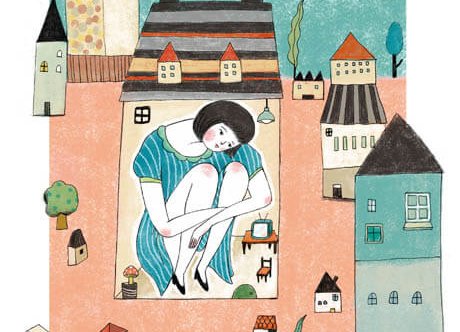7 Signs You Need More Self-Knowledge

Getting to know yourself is perhaps the most difficult, yet most important, thing you can do. There are some signs that indicate whether you know yourself well or not. Of course, nobody can achieve complete self-knowledge, since the process is highly subjective. Being both the subject who learns, and the object to learn about, makes it very difficult to achieve.
Accepting and valuing yourself is one sign that you know yourself well. At the same time, only those who accept and value themselves are able to live satisfying lives. That’s why self-knowledge is so important, since your actions and goals depend on it in large part.
“I think that somehow, we learn who we really are and then live with that decision.”
Education and environment can make this process difficult. Everybody is inevitably interpreted by the people around them from the moment they’re born. In other words, other people give meaning to who we are and what we do throughout our entire lives.
This interpretation is almost never accurate. It has more to do with the people interpreting you than yourself. The process of self-knowledge begins by separating yourself from the way other people see you. So how do you know that you don’t know yourself well? We’ll share a few signs with you below.
You seek your own truth outside of yourself
One of the signs of not knowing yourself well is seeking answers, reasons, or motives in external factors. You don’t believe that you have wisdom. You undervalue what’s inside you and validate things outside of you.

You may or may not have realized that the answers to your feelings, your emotions, and your destiny can only be found within you. And if they come from someone else, they’re always partial and likely wrong. Nothing and nobody else has the right to tell you what you should do or how you should feel. The answer to all that is always within you.
You compare yourself with others
Comparing yourself with others is the wrong way to respond to the questions about who you are and what you’re capable of. You can’t do something just because so and so can, and vice versa. And if a lot of other people are doing something, then that is the right path.
When you compare yourself with others, you’re falling into a trap. Is it reasonable to compare yellow with blue? Would it make sense to draw parallels between water and earth? Comparison only leads to frustration and false self-love, especially when it becomes neurotic.
You regret saying “yes” or “no”
This is another typical sign of a lack of self-knowledge. You doubt all the decisions you make. It doesn’t matter if it’s big or small, you always doubt it. And you often end up choosing the option that you really didn’t want.

You seek approval from powerful figures
People who don’t know themselves well are fascinated by powerful figures. In reality, they don’t evaluate the quality of these people, but rather they view them as important and seek their approval regardless of the values they represent.
Receiving the approval of a powerful figure makes up for the uncertainty caused by not knowing oneself. It’s a way to substitute the bond with one’s own self with another person who has enough power to make your insecurities fade away.
You’re deeply affected by criticism and ridicule
Because you haven’t developed your own criteria to evaluate your own actions, you place too much value on other people’s opinions. If their opinion is one of approval, you feel serenity. If their opinion is critical or disapproving, your world crumbles.

Depending on other people’s opinions is a sure-fire way to distort your self-image. Of course, we all want other people to accept and think highly of us. But it can’t be at the cost of your identity, because at that point, it would be redundant.
If you make a mistake, you want to die
When you don’t know yourself well, you tend to judge yourself harshly. Knowing is understanding, and when you understand yourself, your judgment is more objective. Not only do you look at the results, but also at the processes, causes, and consequences.
Understanding yourself leads to a kinder evaluation of yourself. If you make a mistake, you can forgive yourself more easily because you understand that it’s a learning experience. If you don’t know yourself, you view the mistake as a threat. You’re afraid you might destroy yourself and disappear.
You react to conflict impulsively
People who know themselves aren’t attracted to conflict. They know that they have a limited amount of emotional energy and can’t afford to waste it on unnecessary things. The opposite happens with people who don’t know themselves: they seek conflict as a way to reaffirm themselves. But never conflicts that are too big.
One sign of a good degree of self-knowledge is self-control. If you know yourself, you know how to manage your emotions, and you rarely get carried away by immediate impulses. If not, you overreact to even trivial situations because you feel threatened by everything.
Self-knowledge is a process that takes a lifetime, but any effort you put forth towards it is worth it, because in doing so, you allow yourself to achieve a higher level of awareness, independence, freedom, and security. Don’t deny yourself the opportunity to navigate through the enigmas and wonders of the most important person in your life: yourself.
Images courtesy of Yuschav Arly
This text is provided for informational purposes only and does not replace consultation with a professional. If in doubt, consult your specialist.








